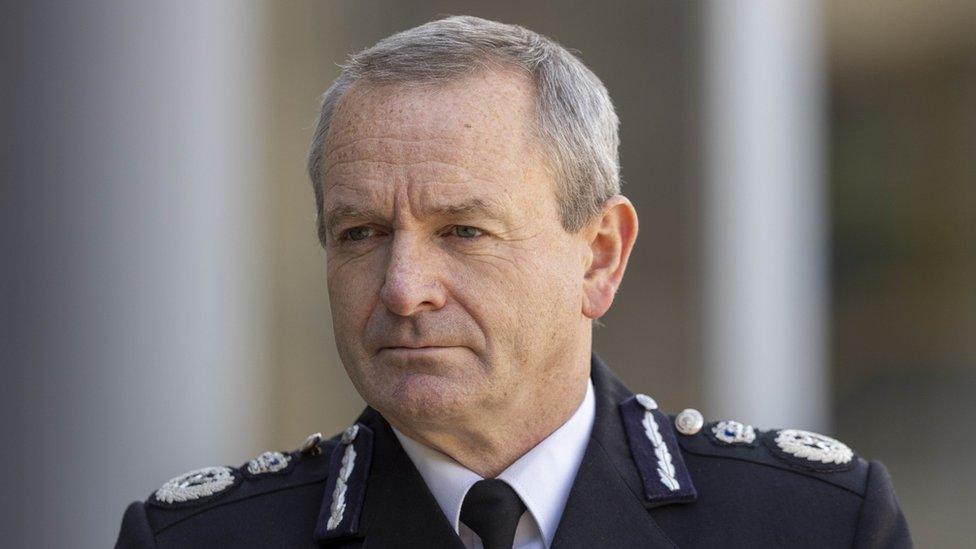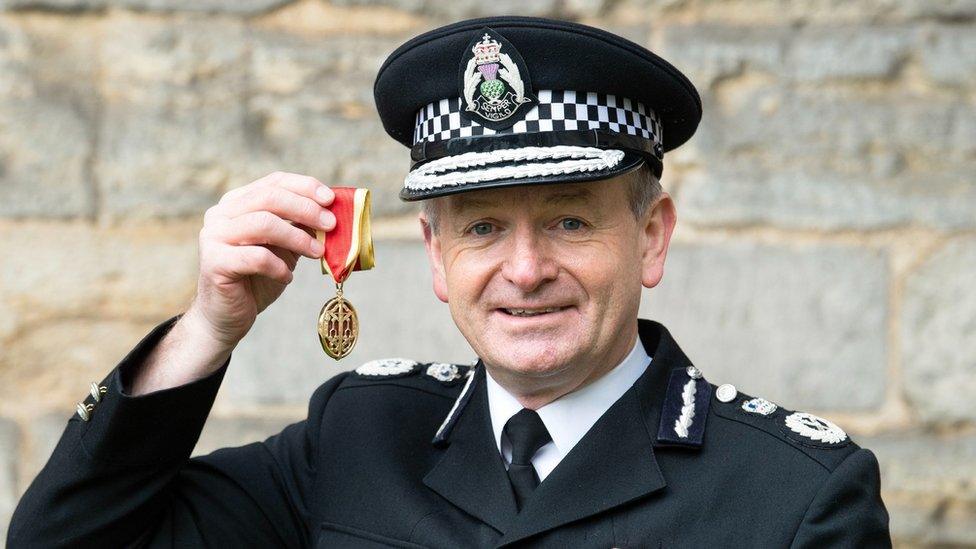Police Scotland chief constable to retire in summer
- Published

Sir Iain Livingstone will retire in the summer
Scotland's chief constable is to retire as the country's top police officer in the summer.
Sir Iain Livingstone, 56, took over the role in 2018 and has been a serving officer since 1992.
He has responsibility for 23,000 officers and staff in what is the UK's second largest police force.
But he had recently raised concerns around the financial pressures facing the service.
He was appointed as interim chief constable in 2017 before being given the job a year later, with his contract due to run until August 2025.
Sir Iain said: "By my last day in service I will have been a police officer for 31 years and had the privilege of serving as chief constable for nearly six of those years.
"Police Scotland is an organisation with shared values and high levels of operational competence. The service improvements achieved in our ten years are unprecedented across the United Kingdom public sector, delivering effective policing for the public.
"We now have a full leadership team with the experience and capability to continue the progress made and can take confidence from the exceptional role Police Scotland played through Covid, COP26 and the events following the death of Her Majesty Queen Elizabeth.
"The police officers and police staff of Police Scotland are outstanding. Leading them as chief constable to serve the people of Scotland has been the honour of my working life."

Sir Iain was knighted at a ceremony in January
Justice Secretary Keith Brown paid tribute to Sir Iain's leadership "through what history will show to be hugely significant events".
He added: "Sir Iain leaves the second largest force in the UK in great shape as it prepares to mark its tenth anniversary - and that is a fitting and lasting legacy to his life of service."
Scottish Secretary Alister Jack thanked the police chief for his years of service, particularly for delivering a "safe and secure" COP26 conference in Glasgow.
Scottish Conservative justice spokesman Jamie Greene said whoever replaces Sir Iain must be "given the resources necessary by them to deliver the level of service our police officers want to offer and which the public expect."
Scottish Labour justice spokeswoman Pauline McNeill said she was personally disappointed that the police force was losing such a dedicated officer.
The announcement that Sir Iain was standing down came as he published a report warning that policing in Scotland is facing "hard choices" given the "unprecedented" financial pressures on the public sector.
The report that was submitted to the Scottish Police Authority said: "Our capital funding remains significantly lower than that needed to progress improvements to our technology, buildings and vehicles".
Last year Sir Iain also claimed that policing was "not one of the priorities" of a government spending review, with the force already having to make £200m worth of savings every year.
Sir Iain joined the Lothian and Borders Police in 1992 and went on to lead major investigations and operations, including a murder investigation into a double shooting at the Marmion Bar in Edinburgh.
He graduated in law from the Universities of Aberdeen and Strathclyde and practised as a solicitor in Edinburgh, Glasgow and London before joining the police service.
He also graduated as a Fulbright scholar with a master's degree from John Jay College of Criminal Justice at the City University of New York.
In 2015 he was awarded the Queen's Police Medal and was knighted by Queen Elizabeth in June 2022 for services to policing and the public.


Neither of the first two chief constables in charge of Police Scotland retired from the job. Both resigned for very different reasons, fuelling a narrative of turmoil at the top of Scotland's national force.
Assuming nothing untoward happens between now and the summer, Sir Iain Livingstone will leave having survived longer in the role than his predecessors combined.
The Chief Constable is not without his critics, but there's no denying he brought stability and calmed things after the force's rocky start.
He has faced unique challenges.
He was in charge when the force had to police lockdown restrictions.
The Cop26 climate summit in Glasgow required the biggest security operation in the UK since the London Olympics, but there were very few arrests and the conference wasn't disrupted.
When the Queen died at Balmoral, his force had to police a series of carefully choreographed public events in front of the eyes of the world. The operation was another success.
The chief has had to face the consequences of two incidents which took place before he took charge.
Sir Iain faced the ignominy of going to the High Court in Edinburgh to watch a judge fine the force £100,000 for failing to respond to a road crash which cost the lives of two people.
He walked past protestors to make a statement at the inquiry into the death of Sheku Bayoh in police custody. His pledge to create a police force that's anti-racist earned praise from the family's lawyer.
The force has also had to deal with allegations of misogyny and paid out £1m to a firearms officer after an employment tribunal ruled she had been the victim of discrimination.
Sir Iain managed to avoid falling out with the Scottish Government, publicly at least.
In recent months, he fought against its proposals for a flat cash budget settlement which would have necessitated severe cuts. In the end the force's budget was increased but not in line with record levels of inflation and major headaches lie ahead.
Sir Iain denies that's why he's going, saying he's dealt with constant financial pressure during all of his time in charge. That's undoubtedly true but it does look like his successor will face even tougher choices as the force tries to balance its books.
In many ways, the cop who planned to retire in 2017 but ended up in charge will be a hard act to follow.